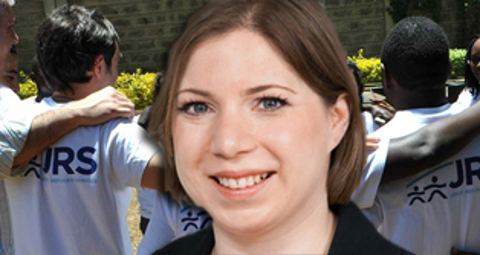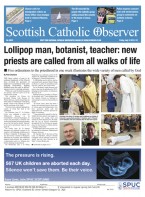June 28 | ![]() 0 COMMENTS
0 COMMENTS ![]() print
print

‘We are trapped in a hostility towards migrants that sees them only as a threat to be controlled’
Sarah Teather, director of the Jesuit Refugee Service, explains how faith can help refugees overcome harrowing experiences
In the UK, people are incarcerated indefinitely, in prison-like conditions, for the purposes of immigration control. Many of these have come to the UK to seek safety, but fallen foul of a notoriously arbitrary asylum system, blighted by a culture of disbelief. Detention is a profoundly traumatic experience. Torture victims tell us it is like being tortured a second time.
People who have worked hard to build a life in adverse circumstances speak of being torn from their families and communities and locked away out of sight. Something has gone badly wrong if we consider this a reasonable way to treat people in the interests of immigration control.
Detention is just one facet of a wider context of the hostile, or compliant, environment agenda—an explicit government policy to make life in the UK unliveable for refused asylum seekers and others with precarious immigration status.
We are trapped in a hostility towards migrants that sees them only as a threat to be controlled, and not as people with histories, relationships, hopes and fears. A social life that should be equally available to all members of society has been overshadowed with antagonism and suspicion. This is the society that sees indefinite incarceration as an acceptable means of immigration control.
Embedded within this hostility towards vulnerable migrants is fear of ‘the other.’ Although having a particular social and cultural identity involves aligning oneself with a particular group, being like others from that group and seeing things from the group’s perspective, it is also important to understand and transverse these appropriated boundaries.
Such an openness enables us to understand new situations, new cultures and new ways of encountering others, while avoiding prejudice and being subject to negative stereotypes that pervade the media. A shift in our moral imagination is dependent on building trust networks, hybrid coalitions forged across a wide range of actors, sharing narratives, and creating a multiplicity of voices.
Jesuit Refugee Service
This openness to others is something we seek to practise on a daily basis at the Jesuit Refugee Service (JRS). We aim to foster communities of hospitality in places where they are absent, and to forge relationships in hostile spaces. JRS staff and volunteers accompany asylum seekers detained at the Heathrow Immigration Removal Centres (IRC), helping them to keep their spirit of resilience, hope and courage alive.
Our detention outreach team visits Heathrow IRC each week. Our main aim is simply to help to build trust between one another, and to combat the toxic ‘othering’ which has penetrated into the national imagination.
Regardless of individual faith or lack thereof, the JRS detention outreach team helps refugees to be recognised as individuals, brothers and sisters—whole people with unique journeys.
JRS works in a holistic manner, accompanying people to reduce feelings of isolation and loneliness, while assuring that people who are out of sight and pushed to the periphery are not forgotten.
Faith
Practising faith can act as a cultural exchange that immigration detention and the hostile environment increasingly seeks to thwart. It seeks to humanise all those situations which have been dehumanised and restore pieces of lost dignity.
Being detained can bring a sense of loss of agency and choice; multiple people have spoken to me of feeling ‘powerless’ in detention, at the mercy of a system that will not speak or listen to them.
Yet practising faith empowers refugees; many tell us that it was faith in God that helped them to get through detention. One person I know from our work in the community described to a colleague how she was part of a praying community in detention. They would pray for each other especially if they were about to be removed. They would also pray for the detention centre officers. This was an act of faith that was simultaneously an act of love and a recovery of lost agency.
Indefinite immigration detention is a cruel and dehumanising practice. JRS, through accompaniment and the formation of human relationships, seeks to counter it. Faith guides us in both practice and principle as we walk with our global brothers and sisters, advocate social justice and aid in restoring a dignified existence. We wish to see the end of this system of discriminatory borders and, instead, build resilient bridges.
– Sarah Teather is director of the Jesuit Refugee Service UK. She is a former Liberal Democrat MP, and served as Minister of State in the Department for Education between 2010 and 2012.










